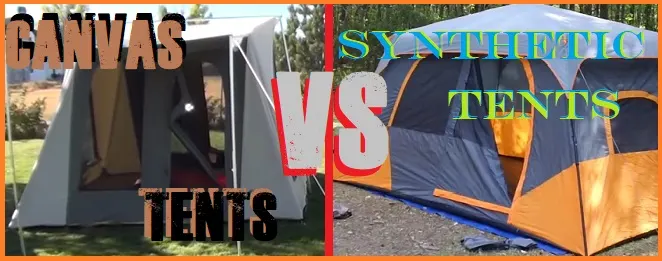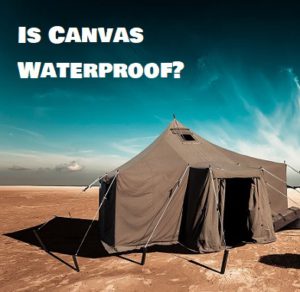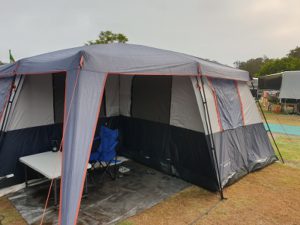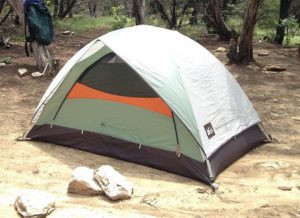In this article, I will be discussing the differences between a canvas tent vs nylon tent vs polyester. When it comes to buying a tent, whether it is your first tent or your 100th tent, it can be confusing to understand all the differences between the hundreds of options.
In order to find the right tent for your needs, it’s essential to eliminate the options that aren’t suitable. To do this, you can start by eliminating the tents that aren’t made out of the material you desire.
But when you don’t know the varying differences between the materials, this can be a challenge. In order to help you understand better, below you can compare the vast difference between nylon, polyester and canvas tents.
Once you have a better understanding of what material you want your tent made from, it will be easier to narrow down the list of 100 potential tents down to a more manageable number.
The last thing you want to feel is overwhelmed by the sheer number of tents available. By narrowing down on what you actually need, you will avoid being so overwhelmed.

The Types Of Tent Materials
Below you can find a more detailed response to the different types of tent materials used, but for the folks in a hurry, you can quickly compare the differences between nylon, polyester and canvas tents no.
Canvas
Best for long term use, one tent can last a lifetime. Canvas tents can be used all year round, including winter as they maintain heat inside the tent the best. Cotton canvas breathes better than nylon so in the warmer months they take much longer to heat up the inside of the tent.
Because canvas is a heavy-duty material, these types of tents are best for people wanting to camp more often than the regular person. Downside to canvas is that it is a heavy material, so not suited for backpacking or hiking.
Nylon/Polyester
Both synthetic materials with the main benefit being their weight. Incredibly lightweight material ideal for all types of campers. Polyester has better waterproofing capabilities compared to nylon, but both can be made waterproof with the use of waterproofing spray.
These types of tents are ideal for the once-off campers and people that camp every so often. If camping is a serious hobby of yours and you plan to go camping for the rest of your life, financially it makes sense to invest in a canvas tent which could last the entire time.
Whereas synthetic tents will breakdown and deteriorate at a much faster rate. The sun and rain can damage a synthetic tent far quicker than a canvas tent. However, as these tents are often cheaper, they make sense for the casual camper who doesn’t mind having to upgrade their tent every few years.
What Is A Canvas Tent Made Out Of
Canvas tents are one of the more common types of tents on the market. They earned this by being very durable and are designed to be an all-season tent as they can handle the cold weather quite well.
But the question is what are canvas tents made of? Most canvas tents are made out of heavy-duty woven fabric, and as a result of this, are far heavier than nylon or polyester tents.
As not all canvas tents are made from the same material, it can be a simple question or a difficult one to answer, depending on how far you want to go with the question. This is because canvas tents are now made out of more than just cotton like they use to be. A big reason that they’ve moved away from cotton is that it weighs more than most man-made fabrics.
100% Cotton Canvas
While cotton canvas tents are harder to find now they’re still worth looking into as they breathe a lot better than a man-made fabric. Tents like the Springbar and the Kodiak Canvas use 100% cotton duck canvas and are the market leaders when it comes to canvas tents.
I believe a canvas tent is best suited to being made out of cotton when compared to the newer man-made fabrics. So a canvas tent can also be made out of polyester, but they have a bit to do before they catch up to a cotton canvas tent.
If you can find a tent made from 100% cotton canvas, go for it I say. The extra weight of the material is nothing compared to the longevity you will get from a high-quality canvas tent.
Are Canvas Tents Waterproof Brand New
Before choosing between canvas or nylon, its only natural to wonder if canvas tents are waterproof, this is a difficult question to answer since not every tent is the same. So it’s not a straight forward yes or no answer.
The first thing would be to check with your manufacturer or the specs before purchasing the tent to find out if it’s waterproof. This will oftentimes answer the question for you.
Canvas Tents Need Weathering
Canvas tents have a unique design to them that a lot of other tents don’t have. This is before going out camping and using them you should set them up in your yard and hose them down. What this does is allow the fabric to swell up and fill in the holes making it waterproof.
This is called weathering or seasoning and is required with a brand new canvas tent.
Can You Waterproof A Canvas Tent?
Some canvas tents do come with their own coat of weatherproofing on them which can be a good thing or a bad thing. Sometimes this coat of waterproofing can make the tent not breathe as well which does hurt one of the advantages of a cotton canvas tent.
However, I would still recommend adding your own coat of waterproofing if you’re concerned. While the woven tight nit cotton canvas repels water quite well, applying waterproof spray annually will ensure you have the ultimate protection.
Waterproof sprays with UV protection will also help to ensure the canvas doesn’t fade and eventually deteriorate in the sun. This is why looking after your canvas tent is so important, if done annually, one canvas tent can last you a lifetime.
Do Canvas Tents Hold Heat
Canvas tents really are a cool style of tent since they’re able to do more things than your standard tent. One of the best things about a canvas tent is that if you bring in something warm like a heater or a stove (If it has a stove jack) it will hold the heat inside of the tent.
This is one of the reasons canvas tents are often the only four-season tents you will find. Their ability to hold the warmth in and keep the cold out is one of their most impressive features.
If the tent includes a stove jack, it makes them even better in the colder climates when keeping that warmth in is so important. Plus you can safely cook inside the tent while it’s snowing outside.
Some people will even have a fire going in their tent, while I personally wouldn’t recommend doing this if you’re a beginner. It’s something you can do as long as you have plenty of ventilation and the tent has some kind of fire retardant on it.
How Does Canvas Perform In Summer?
At the other end of the spectrum is summer, how well does a canvas tent perform in summer? As most people go camping in the warmer months, this is a very important question.
The biggest difference between a canvas tent and a nylon tent in summer is heat retention. A canvas tent takes a lot longer to heat up in the sun. A nylon tent will be like an oven inside the tent within the first 10 minutes.
This is because the nylon material is so thin, the sun’s heat takes no time in penetrating. Whereas a canvas is nice and thick which does a good job of repelling the heat.
The downside to this is that once the sun goes down, the canvas tent will maintain the heat inside the tent for longer. I don’t mind this at times, because you do get cooler nights when camping in summer. But on hot humid nights, it’s imperative that you open windows to let fresh air circulate inside the canvas.
What Is A Nylon Tent
A nylon tent is made out of a 100% synthetic fabric which has its own advantages and disadvantages. This type of fabric is very lightweight which makes it excel in certain styles of camping. If you like to backpack or hike for days on end, then a nylon tent is a good option since they are considerably lighter than canvas tents.
Nylon is fairly water-resistant in its own right and has the ability to be improved further with different levels of the coating. The level of waterproof coating on the tent will greatly affect how waterproof the tent is, which is why some of the cheapest tents are nylon and some of the more expensive ones are as well.
The biggest advantage of nylon tents is that they’re usually quick and easy to set up. This does somewhat come down to the tent you choose, but it’s a common trend with most nylon tents.
One of the biggest disadvantages of a nylon tent is the sun. They don’t handle the UV as well as canvas tents which will cause them to get brittle and not last as long. So it’s a good idea to keep them out of the sun as much as possible to make them have a longer-lasting life.
What Is A Polyester Tent
A high percentage of tents you come across are made out of polyester, so learning a little bit more about it is probably a good idea for the keen camper. They’re very similar to nylon tents in a lot of ways except it’s able to handle the sunlight better, making them more durable than nylon.
They’re made out of synthetic material that does have issues with breathing. For me, this means when looking at a polyester tent it’s a good idea to find out how well it breathes. Whether it’s from having more windows, air vents, extra doors or having a waterproofing coat that allows it to still breathe. These are important factors to look for when looking at polyester tents.
Advantages To A Polyester Tent Over Canvas Or Nylon
One of the best features of a polyester tent is that they don’t require much immediate care when you first get one. Unlike a canvas tent that needs to be weathered or a nylon tent that needs several coats of waterproofing. Polyester doesn’t necessarily need to do this, even tho I still will put a coat of waterproofing on it myself just to be safe.
Polyester is usually sealed up extremely well which makes them great at keeping the rain out. What this means tho is that it’s hard to water to get out and this can cause condensation on the inside of the tent.
The best way to prevent this is to try and get as much ventilation as possible. Ensuring you have air vents either on the ground level or top level of one o both ends of the tent will help to circulate the stale humid air out of the tent.
Canvas Tent Vs Dome Tent
Dome tents have been extremely popular ever since they first got introduced and for awhile were one of the most common types of tents. This made canvas tents disappear for a little bit as everyone wanted the speed and ease of a dome tent.
Both styles of tents have their pros and cons with neither being better just more suited to your style of camping. Dome tents are great as they’re generally lightweight and quick to set up. They also have a tendency to be a little cheaper than a canvas tent so they’re good for those on a budget.
Canvas tents, on the other hand, are some of the best four-season tents you will find. The ability to use one no matter what time of year is a big advantage as you don’t need multiple tents. So it can be worth going with the more expensive upfront cost to save money in the long run.
However, if you’re not a serious camper and only venture out once every year or so, a nylon dome tent will be the better choice. As they are cheaper tents and require less fussing around. Dome tents are limited in size due to their design, so this may also have an impact on your buying decision.
Advantages Of A Canvas Tent Over Nylon
When deciding whether to buy canvas, nylon or a polyester tent, a good approach is to look at the advantages a canvas tent offers in comparison. Canvas tents and nylon tents are like chalk and cheese, although they both provide adequate places to sleep when camping, there is a vast difference.
- Canvas tents have the ability to handle all weather types making them four-season tents where most synthetic tents are 3 seasons. This makes them one of the best winter tents and should be apart of any serious campers collection.
- They have there own style of waterproofing because of what the fabric is made out of which, means not needing to use a waterproofing sealer on them. This means less work for you and more time to relax and who doesn’t like that!
- Keeping the heat in your tent is crucial in the winter months and something that canvas tents excel at. This works really well if your model has a stove jack which will keep your tent extremely warm that you won’t even notice you’re in the snow!
- One of the biggest issues with other types of tents is that they’re not very durable since UV rays make them brittle. Canvas is the exception to this which makes them some of the most durable tents on the market. This makes the higher upfront cost a lot more tolerable when you’re not buying a new tent every year.
- Since a canvas tent is made out of a heavier fabric which some people will see as a downside where I see an advantage. Being heavier means it won’t be getting blown around in the wind when you’re trying to sleep, making it a quieter experience overall.
- Most canvas tents are made out of cotton which is one of the best fabrics when you want the tent to breathe to allow fresh air to circulate and reduce condensation.
How To Clean A Canvas Tent
Once you have decided, yes I’m going to buy a canvas tent over a nylon tent because its a much better long term investment, one of the most common questions I get asked and see online is how do you clean your canvas tent?
You can often tell how well your tent was made by if it stains or not. If it stains then you’re onto a winner. If it doesn’t stain then the tents not going to last which makes this the first thing you need to work out.
Cleaning the canvas tent itself you will only ever want to use water that emulates rain and isn’t to warm. You don’t want to use a power washer or even a hose for this as this can take the waterproofing out of your tent.
Avoid Scrubbing A Canvas Tent
Another thing you don’t want to do is scrub your tent down as this can also take the waterproofing off your tent. These are the first few things you need to learn before cleaning your canvas tent NO high-pressure washing, no detergents/solvents, and no scrubbing. This will help protect your waterproofing.
For things like removing mold from canvas, bird droppings or tree sap, you have two things you can do. For bird droppings, you need to wait until it’s dried then try and scratch it off carefully. Tree sap can be wiped off if you get to it right away otherwise, you will need to wait until it’s dry as well.
If your tent has a silicone waterproofing on it then you will have some advantages that others don’t. If you do get something like bird droppings on it you can clean it off then reapply the waterproofing yourself.
Don’t let a little bit of dirt worry you for your tent, it’s going to get dirty and a bit of dirt won’t hurt it. So just using water is enough to clean your canvas tent. Just make sure you when you go to store it that you wait until it’s completely dry before putting it away.
Can You wash A Canvas Tent In A Washing Machine
While some folks have washed a regular synthetic tent in the washing machine successfully in the past, this is not a practice I would recommend. While you can wash canvas in the washing machine with a special kind of detergent, chances are the tent would be too big for your washing machine.
Your best bet would be to follow the steps listed above and avoid washing a tent in the washing machine altogether.
Conclusion – Choose A Tent For Your Needs
At the end of the day, whether you go for a canvas tent vs nylon tent or a polyester tent, if you buy a high quality tent, it will be up for the task. Either kind of tent material is fine to use in normal camping conditions.
Whether you chose canvas or not will vastly depend on the type of camping you undertake. Its no great surprise that the best tent to live in full time is a canvas tent. They are stronger, more durable and can last a lifetime if well maintained.

Frank
Wednesday 19th of October 2022
Hi, maybe you have some resources to help me with purchasing a large group tent. I am an outdoor ed instructor in NH and do 6 weekend excursions with teens. The group size is up to 16 people. I would like to invest in a group tent with breakdown pole-frame design that students can distribute and carry into our wilderness sites (up to 1/2 mile from the road, sometimes with elevation). I understand that the top needs to be one piece (heavy!) to ensure weatherproof functionality, but I am looking for removable sides and the whole system must be waterproof / windproof. We camp in winter and summer and it needs to handle New Hampshire weather in the White Mountains. I am seriously looking at 12x20 ft carports, which are typically synthetic. I think canvas would be great and worth the money, but it is too heavy. I am not looking to create warmth, just wind and water protection. I also need a floor, so probably need to improvise with tarps. We only use the tent 6 times per year, so synthetic material should do okay for several years. Thoughts? My budget could range up to 2k if I find something that could last 10 years. A heavy duty carport is about $500. White Duck tents look amazing, but I need a modular design that can be carried into the wilderness.
Jan
Thursday 18th of August 2022
What about shrinking cotton canvas? Are cotton-polyester mixes just an average of both characteristics or it's somehow has own properties?